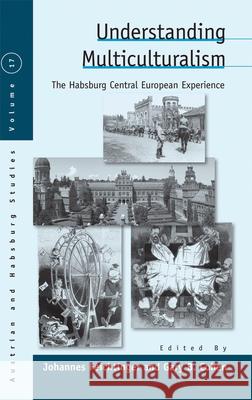Understanding Multiculturalism: The Habsburg Central European Experience » książka
Understanding Multiculturalism: The Habsburg Central European Experience
ISBN-13: 9781782382645 / Angielski / Twarda / 2014 / 256 str.
Multiculturalism has long been linked to calls for tolerance of cultural diversity, but today many observers are subjecting the concept to close scrutiny. After the political upheavals of 1968, the commitment to multiculturalism was perceived as a liberal manifesto, but in the post-9/11 era, it is under attack for its relativizing, particularist, and essentializing implications. The essays in this collection offer a nuanced analysis of the multifaceted cultural experience of Central Europe under the late Habsburg monarchy and beyond. The authors examine how culturally coded social spaces can be described and understood historically without adopting categories formerly employed to justify the definition and separation of groups into nations, ethnicities, or homogeneous cultures. As we consider the issues of multiculturalism today, this volume offers new approaches to understanding multiculturalism in Central Europe freed of the effects of politically exploited concepts of social spaces. Johannes Feichtinger is a Senior Researcher at the Institute of Culture Studies and Theatre History of the Austrian Academy of Sciences, and teaches history at the University of Vienna. His publications include Wissenschaft zwischen den Kulturen. Osterreichische Hochschullehrer in der Emigration 1933-1945 (2001) and Wissenschaft als reflexives Projekt. Von Bolzano uber Freud zu Kelsen: Osterreichische Wissenschaftsgeschichte 1848-1938 (2010). Gary B. Cohen is Professor of Modern Central European history at the University of Minnesota, Twin Cities, where he has also served as director of the Center for Austrian Studies (2001-2010) and chair of the Department of History (2010-2013). He is the author of The Politics of Ethnic Survival: Germans in Prague, 1861-1914 (1981; second rev. ed., 2006) and Education and Middle-Class Society in Imperial Austria, 1848-1918 (1996).
Multiculturalism has long been linked to calls for tolerance of cultural diversity, but today many observers are subjecting the concept to close scrutiny. After the political upheavals of 1968, the commitment to multiculturalism was perceived as a liberal manifesto, but in the post-9/11 era, it is under attack for its relativizing, particularist, and essentializing implications. The essays in this collection offer a nuanced analysis of the multifaceted cultural experience of Central Europe under the late Habsburg monarchy and beyond. The authors examine how culturally coded social spaces can be described and understood historically without adopting categories formerly employed to justify the definition and separation of groups into nations, ethnicities, or homogeneous cultures. As we consider the issues of multiculturalism today, this volume offers new approaches to understanding multiculturalism in Central Europe freed of the effects of politically exploited concepts of social spaces.Johannes Feichtinger is a Senior Researcher at the Institute of Culture Studies and Theatre History of the Austrian Academy of Sciences, and teaches history at the University of Vienna. His publications include Wissenschaft zwischen den Kulturen. Österreichische Hochschullehrer in der Emigration 1933-1945 (2001) and Wissenschaft als reflexives Projekt. Von Bolzano über Freud zu Kelsen: Österreichische Wissenschaftsgeschichte 1848-1938 (2010).Gary B. Cohen is Professor of Modern Central European history at the University of Minnesota, Twin Cities, where he has also served as director of the Center for Austrian Studies (2001-2010) and chair of the Department of History (2010-2013). He is the author of The Politics of Ethnic Survival: Germans in Prague, 1861-1914 (1981; second rev. ed., 2006) and Education and Middle-Class Society in Imperial Austria, 1848-1918 (1996).











